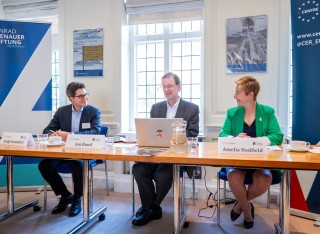
Centre for Britain and Europe
The Centre for Britain and Europe (CBE) is a designated Jean Monnet Centre of Excellence. At the heart of policy research, deliberations, and educational initiatives, CBE assumes a pivotal role as an illustrious institution leading the charge in the analysis of policy affairs in Britain, Europe and beyond.
News and commentary
Stay connected
Latest blog posts
24.02.26
Four Years On: What the War in Ukraine Has Revealed About Europe’s Vulnerabilities
Written by Margaryta Khvostova. Rita is a PhD student at the Politics & International Relations department,...
20.02.26
Out of step COP30: refocusing efforts while the headliners remain vague
Authored by Dr Nikolaos Gkotsis-Papaioannou. Nikos is a senior lecturer in International Politics at...












